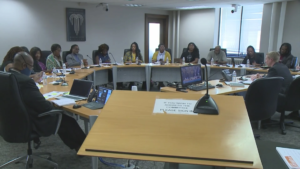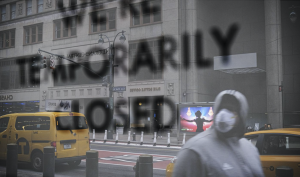You shouldn’t have to live in a blue state to learn or teach America’s racial history in an honest way. But that’s where America seems to be heading — a particularly terrible outcome if, like me, you live in a red state.
It was bad enough when essentially every Republican-dominated state passed laws restricting how racial issues were discussed at the K-12 level. (There has been a separate and equally problematic series of restrictions on books about LGBTQ issues.) Books written by or about luminaries such as Toni Morrison and Rosa Parks are being kept out of school libraries, either because conservative parents objected or officials are worried that they will. Teachers in red states are now leery of saying anything about racial issues that conservatives don’t like — and a few have been removed from their jobs.
Now, Republican officials, particularly in Florida, are going further, seeking to limit colleges from teaching critical race theory and other ideas on race that conservatives oppose. The University of Central Florida, wary of offending the state’s Republican leaders, isn’t offering any courses that primarily focus on racial issues in its sociology department this semester, according to ProPublica. Looking to appease those same Republicans, the presidents of some of Florida’s public colleges have announced a policy barring classes that “compel” beliefs in ideas such as critical race theory. (It’s unlikely any current course mandates that students agree with certain ideas, but this policy is likely to make professors nervous about even discussing them.)
This is a serious escalation. Colleges are supposed to be the places in our society where ideas are allowed to be discussed and debated, even if they are controversial. (Liberals sometimes try to get the speeches of conservatives canceled at universities. They should stop doing that.)Follow Perry Bacon Jr.’s opinionsFollow
I am worried about the future of education in red states such as Florida and Kentucky, where I live. If GOP officials ban any teaching at public schools or universities on race that conservatives don’t agree with, they will prevent people like me (I occasionally attend classes at one of the local universities in Louisville) and my daughter from getting a complete education on these issues. Excellent educators who don’t want to abide by such limitations will leave for other states and/or never come here in the first place.
That would be a terrible outcome, because the racial ideas that have become more mainstream in the past decade have truly improved my life — and I suspect those of other Americans, too.
I am 42, so my formative years were almost three decades after overt discrimination against Black people was outlawed. But it wasn’t as if I lived in a society where race was not a factor. The richest neighborhoods in Louisville, where I grew up and live now, were nearly all-White. So were the honors classes I took in high school. In professional circles in my 20s and 30s, I was often one of the few Black men — and there were even fewer Black women.
In the 1990s and particularly the 2000s, the mainstream conversation in America on race was that the country was moving decidedly in a positive direction, particularly in terms of increasing opportunities for Black people. I don’t recall having many conversations about, say, systemic racism.
Conservatives argue our present-day focus on ideas such as systemic racism make White people feel guilt or shame. I suspect that’s true. But for much of my life, the absence of such ideas left me feeling pretty terrible. We all observed the racial dynamics around us, but we didn’t really know what explained them.
So people adopted explanations that made sense to them. In private conversations, I heard (even sometimes from fellow Black people) that Black people didn’t value education and achievement or were more biologically suited for sports than academics. Some of these ideas were published in newspapers, magazines and books. I had to endure conversations about how I was “one of the good ones,” implying my Black relatives, friends and classmates were not. Organizations, I often heard or read, would love to hire more Black people, but couldn’t find qualified ones. By 2008, the country was said to be “post-racial”: If Barack Obama could be elected president, was anything really holding Black people back?
The emergence of the Black Lives Matter movement pushed me to think more deeply about racial issues. It also provided more opportunities to do so. News outlets started covering these issues much more. I became more educated about two important concepts in particular: Past racial discrimination still deeply affects Black people today, particularly in explaining their low levels of wealth; and some of the United States’ policy structures and systems still result in negative outcomes for Black people even though overt discrimination is outlawed.
The biggest overall lesson was this: There is nothing wrong with Black people as a group. Our reduced levels of wealth and income are the result of U.S. policies. Internalizing these ideas was incredibly reassuring and empowering for me.
I want everyone in America to learn what I did in my 30s much earlier. I often meet White people who have recently learned about, for example, the enduring effects of redlining who say, “Why didn’t they teach us this in school?”
In a society like ours where racial divides are so clear, the choice isn’t between talking about race or not talking about it. The choice is whether to have formal, evidence-based education on racial issues or to leave race out of education settings so that people are left to come to conclusions on their own.
There is certainly room for debate about exactly what that evidence-based education should look like. But there is disagreement among experts on ideas in math, science and history, too — and different views on how those subjects should be taught. We should figure out the best way to teach America’s racial history honestly — not rush to ban anything that offends conservatives.
I don’t think such education will ever be limited in Boston or Los Angeles. It shouldn’t be limited in places like Louisville, either.
Opinions on speech and schools




